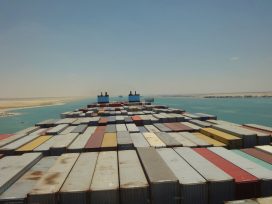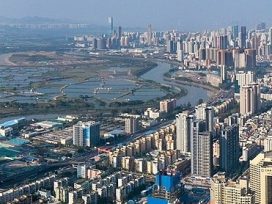When future historians look back on our discordant times, they will surely report an epochal shift of global importance: a transition from failed attempts to restore America’s greatness to China’s return, after two centuries of subjugation, to world pre-eminence. The writing is already on the wall, but strange prejudices, bitter disputes and conflicting predictions currently obscure the implications of such a transformation.
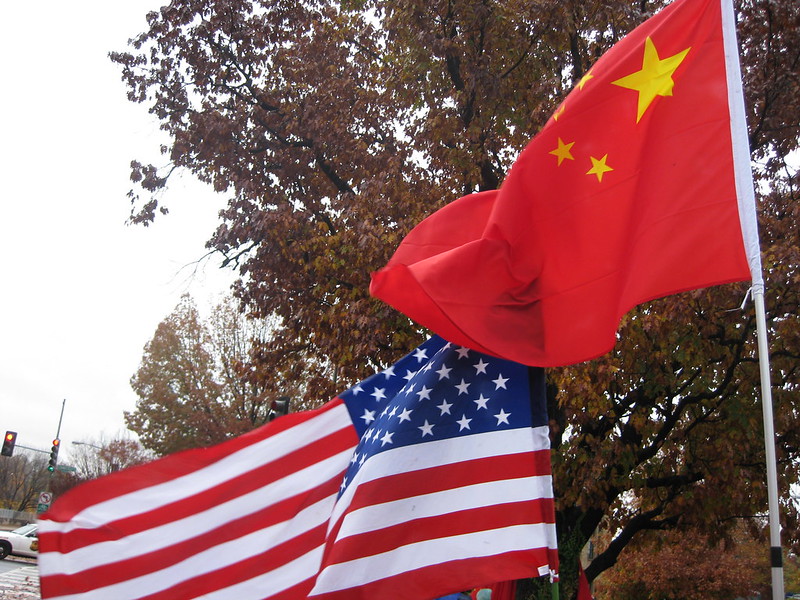
Photo by futureatlas.com via Flickr
Some observers are already sure that ‘the rise of China’ is unsustainable or that forecasts of its global triumph are grossly exaggerated. Others recommend getting tough with an uppity Beijing through trade wars and military clashes in the Taiwan Strait or the South China Sea. Still others believe that a lengthy period of conflict – a new Cold War – is upon us. And there are those who think that the rough-tongued and cack-handed efforts to rejuvenate a militarily overstretched and fiscally overburdened America will unintentionally make China great again.
Like bellows to a fire, outsider misunderstandings of China are inflaming public controversies and stoking political divisions. Matters aren’t being helped by the views of academics, journalists, diplomats and party officials currently circulating inside China. When asked about their country’s role in foreign policy matters, they usually reply that Deng Xiaoping’s era of ‘crossing rivers by feeling for stones’ has been replaced by Xi Jinping’s fearless ‘crossings of oceans’.
The same observers often praise China’s role as a force for moral, economic and political good around the world. More than a few scholars have said that China’s new-found global role is in harmony with the Confucian principle of ‘all under one heaven’ (tianxia). Central to this commitment, they say, is that China is a growing power, potentially a big power (daguo), whose rulers are the latter-day sons of heaven and fathers of the people, upon whom heaven has bestowed the right to rule, and to rule wisely.
The inference is that China’s leaders don’t indulge their own interests at the expense of the needs and interests of the peoples of the world. Otherwise, they know they will be punished: failing to behave benevolently on the world stage by stirring up political disorder or war will jeopardize their ‘mandate of heaven’ (tian ming). That is why, says professor Yan Xuetong, China strives to be an example of ‘humane authority to improve the world’. It is a ‘civilization state,’ adds political scientist Weiwei Zhang, that respects the territorial sovereignty of all states and their peoples. It doesn’t interfere in the affairs of others.
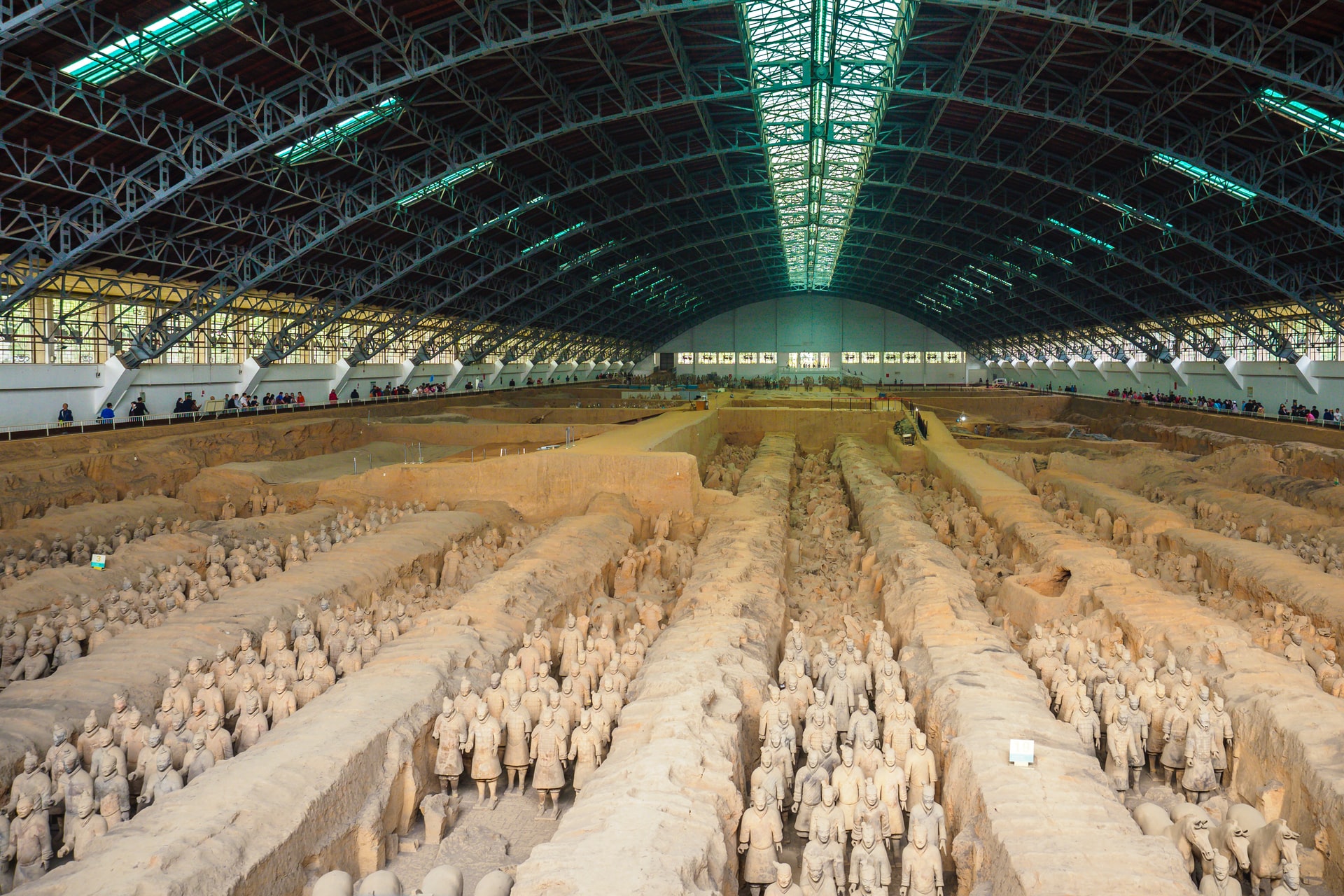
Terracotta Army, funerary art for Emperor Qin Shi Huang (210–209 BCE), photo by Alexander Schimmeck on Unsplash
These Chinese views are unconvincing, above all, because they make no mention of empire. In China, public discussion of empire (diguo) remains rare. Empire is treated as a pejorative term best directed at others; the word is almost never applied to China itself. The historical fact that China was imperially ruled from 221 BCE for over two millennia is bracketed. State officials and media platforms instead use the word empire to stress China’s victimhood (‘the century of humiliation’) at the hands of Western imperialism.
In a case of unexpected symmetry, the word empire also triggers an embarrassed silence in the US. Americans regard themselves as a benign global power, as a democratic force for good. The former defence secretary under George W. Bush, Donald Rumsfeld, said it clearly: ‘We don’t seek empires, we’re not imperialistic. We never have been.’ His words could just as easily have been used by the current Chinese leadership.
A new empire
The Chinese objections to the word empire are remarkable. If ‘empire’ means a jumbo-sized state that exercises political, economic and symbolic power over millions of people at great distances from its own heartlands without much regard or respect for the niceties of territorial sovereignty, then, technically, China is rapidly becoming one. It’s the most accurate word to describe – without knee-jerk rejection or gushing approval – China’s growing global role in capital formation, technology innovation, logistics, and diplomatic, military and cultural power.
For millions of ‘sea turtles’, students and professionals studying abroad, it has become a way of life. Overseas contract workers number well over a million, many in Africa, where more than 10% of employees in Chinese infrastructure projects are engaged in ‘cross-border workforce cooperation’ that yields high wages, sometimes at the cost of long hours, unsafe working conditions, and unpaid and deferred salaries.
Global expansion is also cutting deeply into the everyday lives of hundreds of millions of Chinese. Various drivers ensure that the spirit and substance of empire are percolating through the whole political economy. It’s clear that China is much more than a ‘big power’ – it is an emergent empire of a kind never seen before in world history.
Let’s call it a galaxy empire. The celestial simile helps describe a massive conglomeration of institutions and activities gravitationally centred on the Beijing-led heartlands. The new Chinese empire comprises untold numbers of groups, clusters and super clusters of plans, projects and personnel. Its thoroughly modern dynamics are without precedent – it bears only a limited resemblance to previous Chinese and Atlantic-region empires – and its gravitational push/pull effects are being felt everywhere, even beyond earth’s bounds.
The Belt and Road Initiative (BRI) is China’s most prominent global project. Its scale and complexity are astonishing. Launched in 2013, the huge programme to build railways, roads, deep-sea ports, bridges, power grids and other infrastructure is set to cost more than a trillion dollars, seven times as much (when adjusted for inflation) as the US investment in western Europe after the Second World War. Fifty special economic zones, modelled on the Shenzhen Special Economic Zone that Deng Xiaoping opened in 1980, are planned.
Seen in terms of investment opportunities, export markets and domestic policies designed to boost income and consumption, BRI is clearly China’s alternative to the US’s ‘pivot to Asia’. For instance, the renminbi, China’s official currency, is being promoted among BRI partners as a serious alternative to the greenback.
The BRI is funding megaprojects on a colossal scale: with plans to link more than sixty-five countries, 528 overseas projects currently have a collective contract value of over 50 million US dollars, and this figure is rising fast. Many of these projects – a 5.8-billion-dollar hydropower dam in Nigeria and a high-speed railway linking Kunming to Singapore, for instance – are still under construction, but the contours of the linkages are already clear.
The original Silk Road of the Han Dynasty period (206 BCE – 220 CE) powered a precursor to globalization fuelled by trade networks that stretched west through central Asia, down to the Indian subcontinent and all the way to Europe. The BRI updates this expansionary vision. Beijing-financed infrastructure is reordering the lives of millions, from South Africa, Nigeria, Hungary, Greece, Iran and Sri Lanka to Cambodia, Papua New Guinea, Jamaica, Mexico and Argentina. Every continent is touched by the new empire, including Antarctica, where China will soon open its fifth polar station, outinvesting both US and Australian research and development.
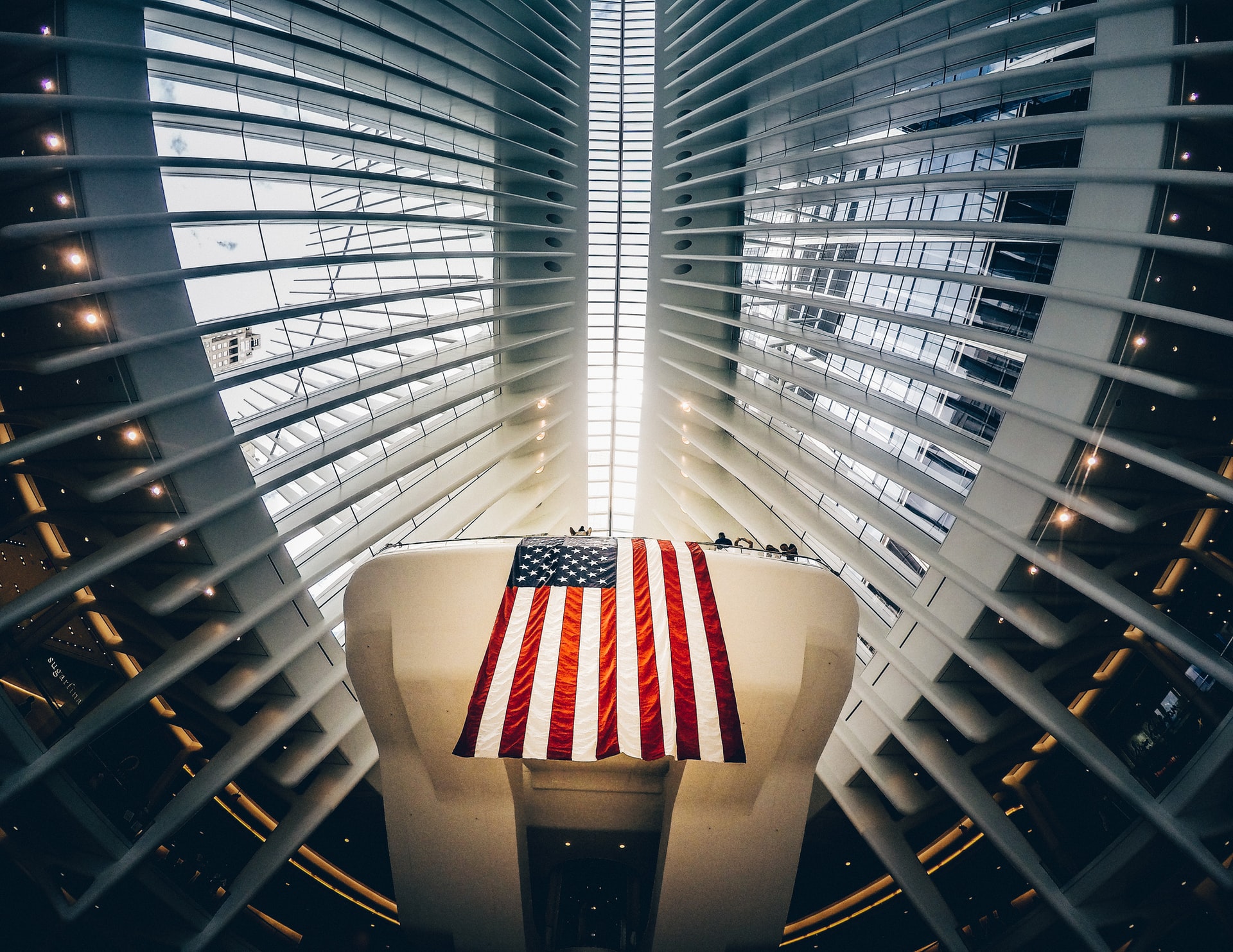
Westfield World Trade Center, photo by Augusto Navarro on Unsplash
None of this should surprise. China has already surpassed the US as the world’s largest trading nation. It owns half of all patents and has outflanked bodies such as the International Monetary Fund and the World Bank to become the largest creditor worldwide. It’s now Africa’s biggest trading partner. In Latin America, it rivals the US with investments, extraction of resources and trade that jumped tenfold in the first decade of this century. China is the largest buyer of iron, copper, oil and soybeans in the region.
The current great pestilence is also working to China’s advantage. In 2020 the country accounted for an unprecedented 30% of global economic growth. Despite facing a rapidly ageing population, China’s empire builders are succeeding in their determination to employ poverty reduction and healthcare, high-technology zone and agricultural export strategies to escape the so-called middle-income trap that bedevilled close to 90% of countries that reached China’s level of wealth during the past generation.
Less transparent is the long-term significance of these trends. What do they tell us? What kind of Chinese empire is emerging on the global level? Does it display novel features? Could they have historic significance?
China is making history on many fronts. Although it isn’t the first genuinely global empire – the US and the Soviet Union were the post-1945 pioneers – the galaxy empire is the first global power to be born of its entanglement with the US, and develop with its help. The grand irony of this wholly unexpected outcome should be noted.
Empires with a truly global footprint are rare. Whatever their stated visions of world conquest, the Mongols, Muslims, Ottomans, Ming Dynasty, the British and other European empires had geographically limited territorial reaches. For the first time, during the years of bi-polarity (1945–89), two relatively detached global empires vied for world dominance. Following the collapse of the Soviet Union, a breakdown uncontested by China, the US tried to do something no empire had ever done: to exercise complete hegemony alone. It failed. So now it has to deal with the realities of a Chinese empire it helped to empower in the early 1970s.
For the first time in human history, two entangled empires marked by competing intentions and practices shadow the globe. For the foreseeable future, the ‘coopetition’ of these two empires will be a fact of life. After all, it is the rule rather than the exception that empires typically come in pairs. Just as the Spanish and English, Portuguese and Dutch, British and American, Russian and Japanese empires locked horns, so China and the US now find themselves energized by deepening competitive rivalries.
It is early days for the galaxy empire. Yet China is busy negotiating and steadily loosening ties with the US: decoupling is already a fait accompli in such areas as credit card transactions, weapons systems, satellite communications, rare earth minerals and AI. Given time, its unusual features will become ever more visible.
The new Chinese empire defies some classic distinctions, most obviously between land and maritime empires. The influential, later disgraced theorist of the German Third Reich Carl Schmitt was sure that every modern empire was preoccupied with land grabbing (Landnahme) and territorial reordering through enclosures and drawing lines and boundaries, often defined with the help of mountain ranges and rivers. Previous Chinese empires were continental land polities whose defence strategies focused on military threats from the north and northwest.
The new Chinese empire similarly guards its own borders, and pushes to consolidate them, as in Hong Kong and the so-called autonomous provinces of Tibet and Xinjiang. It rattles sabres over Taiwan and announces plans to connect it to the mainland via a giant bridge. Its troops stir up trouble in the high-altitude border zone with India. In places such as Sihanoukville, Djibouti and Hambantota, China has already staked out what are in effect ‘leases’, patches of territory they control with the approval of local owner-states.
However, these expansion dynamics are complicated by the fact that China is also a sea power, with ports and bases in every ocean, and is rapidly becoming a major air power. Expenditure on ground, sea and air forces is mushrooming (the PLA has just enjoyed two decades of double-digit budgetary growth). The empire also already figures prominently in outer space colonization.
Its multi-dimensionality explains why its leaders deem boundaries for the sake of uniformity and administrative control relatively unimportant. They understand the pitfalls of penetrating territory deeply. China’s state corporations and governing institutions, even its tourist wanderers – the highest number in the world before the pestilence – prefer unbounded flows and cross-border, long-distance openings and corridor opportunities.
European empires built and functionally depended upon capitol cities at home and in their colonies. China, by contrast, is an empire preoccupied with flows of capital, the spread of new information technologies and global markets for its competitively-priced goods and services. It connects cities and hinterlands with high-speed railways, airports and shipping lanes. Buoyed by its deep dependence on digital communications networks, fluid mobility is the currency of China’s empire.
Communication systems, which shrink space and time barriers, have always been the lifeblood of empires. Britannia could not have ruled the waves without coal-fired steam engines and sails. The railroad and telegraph enabled America’s young empire to push westwards. The vast global reach of China is strengthened not by clippers and copper wire but by networked communications systems backed by giant state-protected corporations – such as the ecommerce and technology behemoth Alibaba, and Tencent, the controller of the multipurpose messaging app WeChat, used by 1.2 billion people worldwide.
These companies are key stakeholders in the ‘cyber-sovereignty’ net China is casting over spaces well beyond its borders. This model, a serious rival to Silicon Valley, uses high-speed broadband flows of information to promote China’s governance, investment and financing schemes, and its ideas, news and culture. The empire’s surging foreign press corporations are an example. Journalists at China Global Television Network and the China Daily newspaper are more than reporters filing stories from abroad: in effect, they double as intelligence providers for the party-state. And cyber sovereignty is big business. The empire is selling its techniques and tools abroad, as in South Africa, the first African country to buy a Huawei-powered 5G network to support smart healthcare and develop ports, mining and manufacturing.
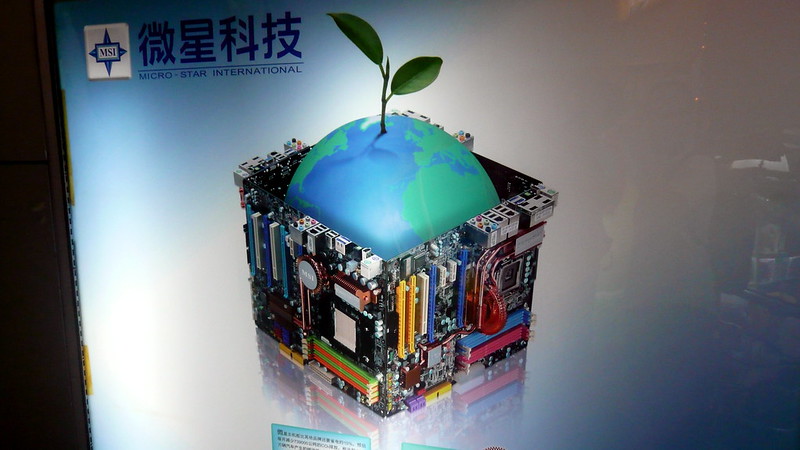
Environmental ad in a computer mall, Shenzhen, China, photo by Cory Doctorow from Flickr
Harold Innis’s much-vaunted distinction between militaristic empires fixated on space and religious empires preoccupied with time is not meaningful in relation to China. Its realm isn’t a gunpowder or dreadnought battleship or B-52 bomber empire. It’s an information empire, the first-ever, four-dimensional empire born of the unfinished digital communications revolution, propelled by commercial interests, innovations such as the Beidou (Big Dipper) global satellite navigation system and multipolar governing arrangements.
China’s commitment to participating in and building cross-border institutions is formidable. Declining empires talk big but look inwards, retreating to strongholds and building walls. Rising empires look towards horizons and fling themselves into – and onto – the world. Through institutions such as the Shanghai Cooperation Organisation alliance and the Chiang Mai Initiative currency-swap arrangement, China actively partners with its fourteen neighbouring states. It plays a high-profile role in regional bodies such as the Asia-Pacific Economic Cooperation (APEC) and the Regional Comprehensive Economic Partnership.
Institutional restructuring and soliciting leadership roles within global bodies is equally high up on its agenda. China already heads four of the fifteen UN agencies. In recent years, it has helped build, and now leads, multilateral institutions such as the China-Arab States Cooperation Forum, which is founded on pragmatic consent, not formal treaty alliances.
Kaleidoscopic government
How does China behave within these institutions? Here’s another novelty: this empire isn’t framed by a dominant ideology. Empires of old typically ruled through a set of legitimating symbols – Portuguese and Spanish emperors were proselytes for monarchy and the Church. China critics say its rulers are in the grip of Marxist–Leninist ideology, while scholars such as Rana Mitter worry about a ‘new nationalism’.
But both assessments miss the point that the regime’s leaders come dressed in colourful coats made of different languages and styles both at home and abroad. They take a leaf out of the book of Charles V, the legendary sixteenth-century Holy Roman Emperor, who learned so many languages to help him rule over his vast empire that he was said to speak Spanish to God, Italian to friends, German to enemies and French to lovers.
The promoters of China’s galaxy empire present themselves in many guises. This gives them the tactical advantage of sailing with the political winds and being different things to different people in different times and places. They are hard to pin down.
The worship of country means that state-enforced amnesia about past mistakes is compulsory – an obligation acclaimed Chinese author Ma Jian satirizes in his novel China Dream with ‘China Dream Soup’, a broth of eternal forgetting. But what’s equally significant is the way CCP leaders spout mantras such as ‘socialism’, ‘harmonious society’, ‘people’s democracy’, ‘rule of law’, ‘ecological civilization’ and ‘ancient Chinese civilization’. Government, business and cultural leaders all adopt this rhetoric when operating abroad.
Power craves authority, which is why the empire throws its cultural weight around on the global stage: Mercedes Benz was humbled into apologizing for Instagramming an inspirational quote from the Dalai Lama; foreign airlines were pressured into deleting online references to Taiwan; the Houston Rockets basketball team paid dearly for its general manager’s tweet in support of Hong Kong protesters.
But there’s evidence that China’s officials and their media publicists are conscious of the reputational dangers of ideological attacks on free expression. Knowing those who grow thorns reap wounds, they want to be seen as champions of peace and tolerance, wealth creation and good governance. Within bodies such as the World Trade Organization, Chinese diplomats and negotiators display strong commitment to rule-of-law precepts and often impress outsiders with their knowledge of procedural rules and technical details, their preparedness and their tough negotiating skills. In matters of public image, there are paradoxical moments when the government – the enemy of multi-party elections – supports voting elsewhere: it outflanked the EU and the US by providing Cambodia with computers, printers, voting booths, ballot boxes and election monitors for its sham mid-2018 general election; and it donated large quantities of personal protective equipment to Myanmar for its 2020 general election.
The de-facto emperor displays a similar kaleidoscopic style. Xi Jinping, the ‘Chairman of Everything’, doesn’t exude the unchecked megalomania of dictators such as Napoleon, Stalin and Hitler. He’s more like Shakespeare’s Duke of Gloucester, confident in his ability to boost power, prestige and ‘add colours to the chameleon, change shapes with Proteus’. He gives a whole new meaning to dialectics: at home, he’s a tough-minded, iron-fisted champion of ‘socialism’, head of the armed forces and benevolent man of the people; abroad, he dons the mantle of moral redeemer, champion of ancient Chinese civilization and stout defender of peace through multilateral institutions.
The Chinese commitment to cross-border flows helps explain the galaxy empire’s position as champion of planetary peace. No empire was ever built and sustained without force of arms, and yet the new empire galaxy is not principally understandable as militaristic, comparable, say, to the Axis powers (Japan, Germany and Italy) or sixteenth century Spanish conquistadors, whose love of gold and land led them to besiege and starve their Aztec opponents into submission.
China’s self-portrayal as a force for global peace rests upon spin, silence and secrecy: according to Stockholm International Peace Research Institute (SIPRI) data published in 2020, China is now the world’s second-largest arms manufacturer and has more cruise missiles and middle-range ballistic rockets than the US. Its navy is the world’s largest. Military bases to supplement the People’s Liberation Army’s existing Djibouti and Tajikistan installations are probably in the planning stage.
China’s public relations task is nevertheless made easier by America’s excessive militarization. Those who speak of China as a ‘bully’ and an ‘aggressor’ must remember that the US is still the world’s commander-in-chief. It has military bases and installations in 150 countries and spends more on its armed forces than the following ten countries’ combined investment.
China’s active contributions to UN peacekeeping operations reinforce its reputation as an irenic empire. Landmines cleared on the southern Lebanon border with Israel are a case in point. China’s best-known foreign engagements so far have been the withdrawal of its civilians from conflict zones as in Libya in 2011 and Yemen in 2015. A Chinese version of the ‘responsibility to protect’, advocating the foreign ministry’s spin that ‘military officers must be the guardians of the people’s security and military ships must be like Noah’s Ark for our compatriots’, suddenly replaced the doctrine of non-interference in the affairs of other states.
Finally, China’s unconventional military strategy towards the US bolsters its peaceable claims: since it is not an empire in a hurry, it can act under ancient Sun Tzu guidance to wear down its competitor by avoiding conflict, demonstrating that deferral can yield lasting victories.
Taming Chinese power
The history of empires is suffused with talk of ‘decline’, ‘fall’ and ‘collapse’ for good reason. Even the mightiest empires are eventually undone by weaknesses: rising costs and revenue shortages, cumbersome and corrupt administrations, unrest on their margins.
Opinions about the new Chinese empire’s sustainability are divided. Former US secretary of state Henry Kissinger is among those who are convinced that we have entered the Chinese century. Others say the growth dynamics can’t last, that Xi Jinping’s imperial scope will suffer the fate of many of China’s past dynasties. Who is right? What can be said about the new galaxy empire’s durability?
Predictions of China’s future are warped by wishful thinking. ‘I’d give the regime a couple of years, no more than a decade,’ a prominent China scholar told me three years ago. He has been saying the same thing for three decades. This bravado is the flipside of the ill-fated 1990s prediction that market reforms would turn China into an American-style liberal democracy. Regime collapse is also on the political agenda of hawks, who liken China to a house of cards, liable to be scattered by a firm flick of the wrist.
They want a new Cold War. They’re convinced of American democracy’s moral superiority. China to them is a dragon power responsible for stealing American jobs and the global pestilence. Like former Trump adviser Stephen K. Bannon, they are sure that ‘the lies, the infiltration and the malevolence’ of its rulers renders China just as vulnerable to collapse as its Soviet predecessor. They stir up public sentiment against the ‘totalitarianism’ and ‘authoritarianism’ of the CCP-led regime. They see acts of silent espionage and takeovers of businesses, governments, universities, newspapers, churches and civil society bodies beyond China’s borders. They warn of threats to ‘sovereignty’ and the death of liberal democracy.
There may be some validity in these warnings. Empires always try to shift the balance of power in their favour: just as the Soviet Union was once the great hope for state socialism, so China is now the global torchbearer of post-democratic forms of government.
The trouble is this new Cold War politics spreads fickle misconceptions. It understates the resilience of the phantom democracy that anchors the CCP regime, its reliance upon village elections, talk of ‘the people’ and experiments with neighbourhood assemblies, public hearings, participatory budgeting and anti-corruption mechanisms built into state bureaucracies. The warriors’ sense of history of empires, masterfully probed in such works as historian John Darwin’s 2007 book After Tamerlane, is feeble. They wrongly imagine the new Chinese empire to be a repeat of Ottoman bribery, corruption, decadence and quarrelling advisers.
Talk of ‘getting tough with China’, intended to discomfit and debase, is actually a cry of pain from the West. It attracts xenophobes, racists and Orientalists. These bull-in-a-China-shop warriors seem blasé about the probable consequences of the desired downfall – ‘the collapse of a world empire,’ notes the German scholar Herfried Münkler in his 2005 book Empires, ‘usually means the end of the world economy associated with it.’ They may be picking a fight that delivers political, economic and reputational setbacks to the US, or further hastens its demise as an imperial power.
Reckless China-bashing and moonstruck love affairs with America are dead ends. Talking up military aggression in the age of nuclear weapons is madness. Since there is no Thucydides Trap (the idea that armed conflict is almost inevitable when a rising empire challenges an established one) except in the heads of the ‘New Cold Warriors’, a realistic strategy for engaging China is needed.
We could call it agile non-alignment. Governments, businesses, non-government organizations and citizens committed to engaging critically with China would embrace cooperation in such fields as infrastructure development, scientific research, higher education and renewable energy. They are aware that, just as the solutions to every global problem today require cooperation with China, engagement with the empire has its ups and downs. Some prickly exchanges with Chinese partners are to be expected.
Former Australian prime minister Kevin Rudd was on to something: when it comes to dealing with China and its allies and opponents, he liked to say, truly durable friendships (zhèng yǒu) are built on unflinching advice and frank awareness of basic interests and ambitions. Such frankness can yield positive results. On this logic, breaking up with China isn’t necessary. It would be self-destructive and foolish.
Agile non-alignment necessitates open minds: a new willingness among political thinkers, journalists, citizens and politicians to dissect their own ignorance about China, to see with fresh eyes its complexity and to avoid underestimating its shape-shifting resilience. Evidence speaks against exaggerations such as journalist James Kynge’s claim that China ‘so vaunted for planning its own extraordinary development’ is revealed as ‘largely unable to pull off the same feat abroad’. Such generalities not only downplay the CCP’s crisis management capacities, demonstrated by its handling of the COVID-19 pestilence. They also underplay the empire’s structural weaknesses.
Imperial flaws, democratic openings
These vulnerabilities offer political opportunities for democratically elected governments and socially responsible businesses and other civil society organizations to protect and enhance their values and interests. Positive sum or ‘win-win’ outcomes can even be extracted from negotiations and disputes with Chinese state and corporate protagonists. But what are the new Chinese empire’s flaws that provide such openings?
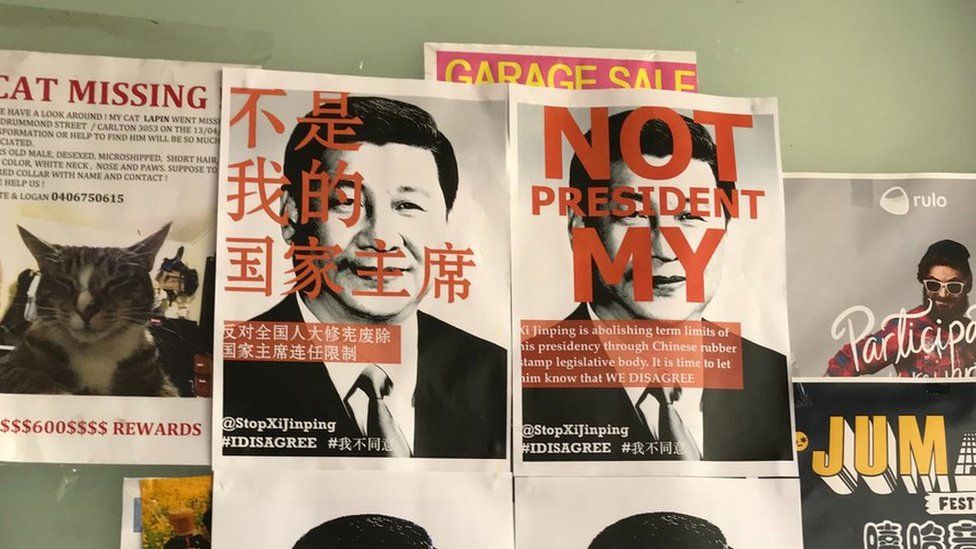
Anti-Xi posters in university campuses outside China, photo via STOPXIJINPING on Twitter
Most obviously, legitimacy issues trouble China. Its leaders are already being reminded that overt influence and control create resistance and social unrest, as in Tibet, Xinjiang and Hong Kong; they are learning that they cannot unilaterally determine the habits and hopes of others.
Every Chinese government official, diplomat and businessperson should read Ivo Andrić’s 1947 novel The Vizier’s Elephant, a classic tale of resentment against the pinched promises and hypocrisy of occupiers, to grasp how easily imperial power can be doubted, satirized, worn down and defeated. The age of communicative abundance makes cultural resistance – mutinies against the maltreatment of local workers, for instance – much easier. Digital tools give new life to the Chinese writer Lu Xun’s saying that ‘discontent is the wheel that moves people forward’. Local disenchantment with the empire can readily follow: in 2019 large-scale protests raged in Kazakhstan against the construction of Chinese factories and the maltreatment of Muslim and Turkic peoples in Xinjiang; and Zambian miners have clashed with their Chinese employers for decades.
Classic imperial tensions between central rulers and remote governors also trouble China. When Chinese state-owned companies invested in the Libyan petroleum industry and infrastructure projects, they never anticipated the local regime’s collapse in 2011, which required a military rescue operation that inadvertently raised suspicion over Chinese arms sales to the Gaddafi regime, embarrassing the Ministry of Foreign Affairs. The galaxy empire stumbled. Talk of ‘non-interference’ in ‘sovereign’ states was dropped. After declining to veto a UN Security Council resolution sanctioning NATO bombing of Gaddafi’s forces, it then urged compromise with the regime and condemned the airstrikes. As the regime collapsed, Chinese forces intervened to protect seventy-five Chinese companies and deliver 38,000 workers to safety.
Looming challenges hint at other weaknesses. Rising tensions over debt collection raise concerns over whether persuasion, legal proceedings or force should be used to handle conflicts. Like all empires in Chinese and modern world history, the galaxy empire is threatened by succession problems. China’s twenty-first-century fortunes may be harmed by Xi Jinping’s mishandled appointment of his successor, just as Mao did in the 1960s.
There are environmental concerns, too. China invests much more in renewable energy than the US, yet at least a third of its groundwater is unfit for human consumption. And there are bio-challenges abroad, in places such as Antarctica, where the Chinese-owned Shanghai Chonghe Marine Industry Company, awaiting delivery of the world’s largest krill-fishing boat, is sure to encounter protests against its profit-driven plans to mega-harvest the small crustacean currently suffering population decline in delicately balanced biomes.
These issues feed China’s greatest vulnerability: its lukewarm and contradictory embrace of public accountability mechanisms. China’s leaders say they want open connectivity and uncorrupted cross-border institutions based on consultation. Yet, as a one-party regime, it requires secrecy, dissimulation and unchallenged power. Several leading Chinese international relations scholars have told me privately that their country can’t succeed globally unless it opens its power structures to much greater public scrutiny, both at home and abroad. Its currency, they believe, must be vigilance, wise deference to complexity and humble open-mindedness. They have a point: democracy shortages are China’s greatest weakness.
Well-functioning monitory democracies nurture watchdog bodies such as public enquiries, judicial review and futures commissions designed to deal with threatening uncertainties, corruption and nasty surprises. At home and abroad, China tries to mimic these methods. Infrastructure projects embrace Japanese-style quality investment standards. In places such as Sri Lanka, poster campaigns announce ‘extensive consultation, joint contributions, shared benefits’.
Yet unexpected events can extinguish these promises. A corruption scandal, poisoned food chains, the collapse of a corporate behemoth or state bank, or sudden social resistance to infrastructure projects can rock China’s power to its foundations. Small beginnings can hatch big dramas.
Democratic openings can occur. Backed by demands for public accountability, supported by civil society organizations and political leaders, the push for monitory democracy can spread – even from the empire’s margins back into its heartlands. Cross-strait troubles with democratic Taiwan might well prove to be an example in the coming months and years.
But it may be that China’s galaxy empire develops a commanding resilience most observers hadn’t anticipated. Among the biggest imaginable surprises might be that its rulers, tempered by skittishness and smart governing methods, succeed in harnessing phantom democratic mechanisms not only at home to legitimate and strengthen their single-party rule but also abroad. China might perfect the art of what has been called ‘administrative absorption’: the ability to win over resistance, to convince clients everywhere that Chinese infrastructure projects, ways of life and commitments to multilateral governance are universally good and clearly superior to the confused American alternatives on offer.
Suppose the present Chinese political system humbles the US and, in just twenty-five years, its economy becomes twice as large, with its well-educated population at least half as wealthy as Americans. Then imagine that those who govern the new Chinese empire outdo the Ottomans and the British in paying homage to their subjects everywhere, employing surprising degrees of self-scrutiny, experimentation and administrative absorption. Let’s further imagine that a mix of economic growth, social policy, state surveillance, political repression, middle-class support, dreams of restoring China to greatness and American foolishness all help to fertilize its power. Wouldn’t China become the global standard bearer for one-party government grounded in the willing loyalty of its people and its clients and supporters abroad – a strange new, ultra-modern post-democratic regime with a democratic feel? Not a ‘thoroughgoing return to totalitarian politics,’ as Chinese scholar Xu Zhangrun has warned, but a tremendously powerful phantom democracy triumphantly beating a path towards a world with limited room for the power-sharing constitutional democracy of earlier, happier times.
